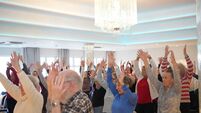Dr Michelle O'Driscoll: Self esteem is important for our wellbeing

Self-esteem has been shown to contribute to improved mood, improved confidence and self- assuredness, and better quality relationships with others. Picture: Stock
A very important part of our wellbeing is our self-esteem, but what exactly is meant by that?
Well, imagine you’re looking in a mirror, seeing your reflection but also who you are on the inside. What feelings and thoughts pop up? These are related to your self-esteem, to how you view yourself, and how much you value yourself.
You might or might not think that you’re great, but self-esteem runs deeper than this.
True self-esteem appreciates and acknowledges our own strengths, understands and accepts our flaws, and recognises that we’re unique and valuable just as we are.
What a weight this would lift off so many of our shoulders if we could get to that place. Less self-criticism, less internal pressure, more ease and internal peace.
Self-esteem has been shown to contribute to improved mood, improved confidence and self- assuredness, and better quality relationships with others.
Some of the myths of self-esteem are tough to unlearn. “If I win, I’ll always feel good.” This seems like it should be true, but self-esteem is built on more than succeeding, its also based upon the smaller, seemingly insignificant things that you enjoy such as interactions with others, fun and reflection.
“Self-esteem is something I’m born with, it doesn’t change.” This myth thankfully for most of us isn’t the case, we can work towards improving it over time.
“Everyone cares about every mistake that I make.” This can be a really debilitating belief, because we hammer ourselves with criticism as a result. The reality is most mistakes go completely unnoticed by others, and those that are picked up on are viewed a lot less critically than we’d think.
So, knowing that self-esteem might be affecting our wellbeing, and wanting to do something about it, what can we try?
Awareness is key – awareness of the talk in our head, the emotions we’re experiencing, the actions we take based upon low self-esteem. Awareness leads to possible change.
Start watching closely at times where you feel you’ve failed somehow, and notice what your mind is saying. Is it critical, harsh or even insulting? How does that make you feel, and therefore what do you do next?
Often, none of this is positive or supportive, and it can be really challenging to offer any sort of kind words to ourselves. Try imagining it’s a close friend or child in the same situation, the words automatically become more encouraging, supportive and uplifting, and this reflects in the feelings and actions.
Find your tribe - and they do exist. Not everybody is for you, or rooting for you. Reflecting on who in your life makes you feel accepted, appreciated and celebrated is a good way to focus your efforts on spending time with them, and those like them. Chances are you bring the same feelgood, positive outlook to their lives, and it means that everybody’s self-esteem and feeling of belonging is being nurtured.
Limit the time spent with people who make you feel not good enough, or less than. We’re doing enough of that to ourselves with out external input!
Flip the script – having become more aware of the situations where your self-talk is negative, you have an opportunity to change the narrative and boost yourself. At first, you may not believe what you’re saying, as self-esteem is rooted in our core beliefs – which can be stubborn to shift. But over time, if you’re replacing something like “I’ve completely failed at this, just like I completely fail at everything else” to “I’m learning and growing from my mistakes” then little by little you’ll chip away at the self-esteem status quo, and move towards being your biggest cheerleader instead of your own worst enemy. Practice makes perfect with this, so be patient with yourself.
Self-esteem is important for our wellbeing and mental health, and is something that we can work towards increasing if it’s holding us back.







 App?
App?


